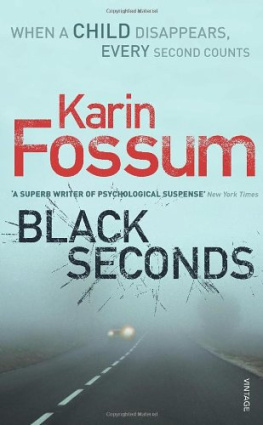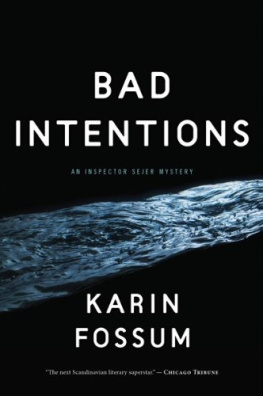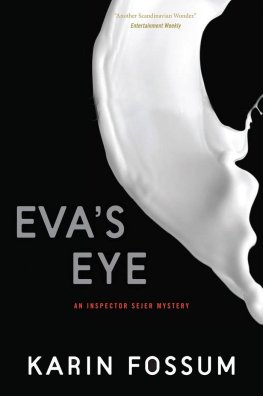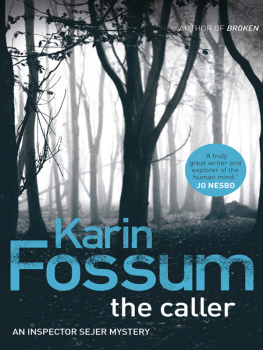Translated from the Norwegian
by Felicity David
A HARVEST BOOK
HARCOURT, INC.
ORLANDO AUSTIN NEW YORK
SAN DIEGO TORONTO LONDON
Copyright J. W. Cappelens Forlag, A.S., 1998
English translation copyright Felicity David, 2004
All rights reserved. No part of this publication may be reproduced
or transmitted in any form or by any means, electronic or mechanical,
including photocopy, recording, or any information storage and
retrieval system, without permission in writing from the publisher.
Requests for permission to make copies of any part of the work
should be submitted online at www.harcourt.com/contact or
mailed to the following address: Permissions Department,
Harcourt, Inc., 6277 Sea Harbor Drive, Orlando, Florida 32887-6777.
www.HarcourtBooks.com
This is a translation of Djevelen holder lyset
First published in English by The Harvill Press in Great Britain, 2004
The Library of Congress has cataloged the hardcover edition as follows:
Fossum, Karin, 1954
[Djevelen holder lyset. English]
When the devil holds the candle/Karin Fossum;
translated from the Norwegian by Felicity David.1st U.S. ed.
p. cm.
I. David, Felicity. II. Title.
PT8951.16.O735D5413 2006
839.8'238dc22 2005034641
ISBN 978-0-15-101188-9
ISBN 978-0-15-603212-4 (pbk.)
Text set in Minion
Designed by Scott Piehl
Printed in the United States of America
First Harvest edition 2007
A C E G I K I H F D B
With thanks to Terje Ringstad and Tor Buxrud
Chapter 1
The courthouse. September 4, 4 P.M.
Jacob Skarre glanced at his watch. His shift was over. He slipped a book out of his jacket pocket and read the poem on the first page. It's like virtual reality, he thought. Poof!and you're in a completely different landscape. The door to the corridor stood open, and suddenly he was aware that someone was watching him, someone just beyond the range of his excellent peripheral vision. A vibration, light as a feather, barely perceptible, finally reached him. He closed the book.
"Can I help you?"
The woman didn't move, just stood there staring at him with an odd expression. Skarre looked at her tense face and thought she seemed familiar. She was no longer young, maybe about sixty, and wore a coat and dark boots. There was a scarf around her neck, just visible; he could see it above her collar. Its pattern offered a sharp contrast to what she most likely possessed in the way of speed and elegance: racehorses with jockeys in colorful silks against a dark blue background. She had a wide, heavy face, elongated by a prominent chin. Her eyebrows were dark and had grown almost together. She was clutching a handbag against her stomach. Most noticeable of all was her gaze. Her eyes were blazing in that pale face. They fixed him with a tremendous force. Then he remembered who she reminded him of. What an odd coincidence, he thought, as he waitedfor her to speak. He sat there as if riveted by the silence. Any minute now, she was going to say something momentous.
"It has to do with a missing person," she said.
Her voice was rough. A rusty tool creaking into motion after long idleness. Behind her white forehead burned a fire. Skarre could see it flickering in her irises. He was trying not to make assumptions, but obviously she was possessed. Gradually it dawned on him what sort of person he was dealing with. In his mind he rehearsed the day's reports, but he could not recall whether any patients had been listed as missing from the psychiatric institutes in the district. She was breathing heavily, as if it had cost her considerable effort to come here. But she had made up her mind, driven by something. Skarre wondered how she had got past the reception area and Mrs. Brenningen's eagle eye.
"Who is missing?" he asked in a friendly voice.
She kept staring at him. He met her gaze with the same force, curious to see if she would flinch. Her expression turned to one of confusion.
"I know where he is."
Skarre was startled. "You know where he is? So he's not missing?"
"He probably won't live much longer," she said. Her thin lips began to quiver.
"Whom are we talking about?" Skarre said. He hazarded a guess: "Do you mean your husband?"
"Yes. My husband."
She nodded resolutely, stood there, straight-backed and un-moving, her handbag still pressed to her stomach. Skarre leaned back in his chair.
"Your husband is sick, and you're worried about him. Is he old?"
It was an inappropriate question. Life is life, as long as a person is alive and means something, maybe everything, to anotherhuman being. He immediately regretted having asked, picked up his pen from the desk, and began twirling it between his fingers.
"He's like a child," she said sadly.
He was surprised at her response. What was she talking about? The man was sick, possibly dying. And senile, it occurred to him. Regressing to his childhood. At the same time Skarre had a strange feeling that she was trying to tell him something else. Her coat was threadbare at the lapels, and the middle button had been sewn on rather badly, creating a fold in the fabric. Why am I noticing these things? he wondered.
"Do you live far from here?" He glanced at his watch. Perhaps she could afford a taxi.
She squared her shoulders. "Prins Oscars Gate 17." She enunciated the street name with crisp consonants. "I didn't mean to bother you," she said.
Skarre stood up. "Do you need help getting home?"
She was still staring into his eyes. As if there were something she wanted to take away with her. A glow, a memory of something very much alive. Skarre had a weird sensation, the sort of thing that happens only rarely, when the body reacts instinctively. He lowered his gaze and saw that the short blond hairs on his arms were standing on end. At the same moment, the woman turned around and walked slowly to the door. She took short, awkward steps, as if she were trying to hide something. He went back to his chair. It was 4:03 P.M. For his own amusement, he scribbled a few notes on his pad.
"A woman of about sixty arrives at the office at 4 P.M. She seems confused. Says her husband is missing, that he doesn't have long to live. Wearing a brown coat with a blue scarf at her neck. Brown handbag, black boots. Possibly mentally ill. Left after a few minutes. Refused offer of help to get home."
He sat there, turning her visit over in his mind. She was probably just a lost soul; there were so many of them nowadays. Aftera while he folded the piece of paper and stuck it into his shirt pocket. The incident didn't belong in his daily report.
***
HAS ANYONE SEEN ANDREAS? That was the headline in the town's largest newspaper, set in bold type. That's the way newspapers express themselves, using an informal tone to address us directly, as if we were on a first-name basis and have known each other a long time. We're supposed to break down the barriers of formality and use a straightforward, youthful tone in this fresh, onward-storming society. so even though very few people actually knew him or used his first name, let's just cut right to the chase and ask: Has anyone seen Andreas?
And the picture of him. A nice-looking boy of eighteen, with a thin face and unruly hair. I say "nice-looking"; I'm generous enough to admit that. so handsome that things came easily to him. He strutted around with that handsome face and took things for granted. It's a familiar pattern, but it does no one any good to look like that. Handsome in a timeless, classic way. A charming boy. It costs me a bit to use that word, but all the same ... charming.
Next page











